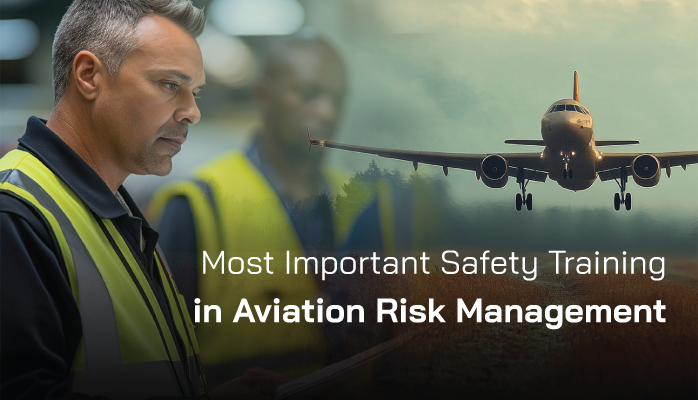
Training Employees for SMS Compliance
Training your aviation team for Safety Management System (SMS) compliance can feel like navigating a storm. With time constraints, varying skill levels, and strict regulatory requirements from the FAA, EASA, and ICAO, the process can overwhelm even the most seasoned safety managers. But it doesn’t have to. By leveraging user-friendly tools like SMS Pro’s embedded training videos and Global Safety Training Portal, you can streamline aviation SMS training and empower your team without the stress.
In this guide, we’ll share seven practical tips to train your aviation team for SMS compliance efficiently, using SMS Pro’s intuitive tools to make the process seamless. From overcoming common challenges to aligning with global standards, we’ll show you how to make training engaging, effective, and stress-free. Plus, we’ll dive into a real-world example of a small airport that trained 30 staff members in just one week using SMS Pro.
Why Aviation SMS Training Matters
An effective SMS is the backbone of aviation safety, helping organizations proactively identify hazards, manage risks, and ensure compliance with international standards like ICAO Annex 19. But an SMS is only as strong as the team behind it. Without proper training, your staff may struggle to understand their roles in hazard reporting, risk management, and safety assurance—putting your operation at risk.
Training isn’t just about checking a regulatory box; it’s about fostering a safety culture where every team member feels confident contributing to safer skies. Whether you’re managing an airline, airport, or flight school, ICAO SMS training ensures your team is equipped to meet FAA and EASA requirements while keeping safety first.
Challenges of Aviation SMS Training
Before we dive into solutions, let’s address the common hurdles safety managers face when training for SMS compliance:
- Time Constraints: Aviation teams are busy with daily operations, leaving little time for lengthy training sessions.
- Varying Skill Levels: From seasoned pilots to new ground staff, employees have diverse backgrounds and technical abilities.
- Regulatory Complexity: Aligning training with FAA, EASA, and ICAO standards requires a deep understanding of requirements.
- Engagement: Keeping staff motivated during training, especially for recurring sessions, can be tough.
Fortunately, tools like SMS Pro training tools are designed to tackle these challenges head-on, making training accessible, engaging, and compliant.
7 Practical Tips for Effective Aviation SMS Training
1. Start with a Clear Training Plan
A structured plan is the foundation of successful aviation SMS training. Begin by mapping out your goals: What does your team need to know to comply with FAA and EASA requirements? Break it down into key SMS components—safety policy, risk management, safety assurance, and safety promotion.
SMS Pro’s Safety Training Article Library simplifies this process by offering customizable training modules. You can create a plan tailored to your operation’s size and complexity, ensuring every employee, from executives to line staff, gets the right level of training. Set clear timelines and milestones, like completing initial training within a month, to keep the process on track.
2. Use SMS Pro’s Embedded Training Videos
Time is precious in aviation, so make training quick and digestible. SMS Pro’s embedded training videos are short, engaging, and designed for busy teams. Covering topics like hazard reporting and risk assessment, these videos break down complex concepts into bite-sized lessons that even non-technical staff can grasp.
For example, a video on “How to Submit a Hazard Report” walks employees through the process in under five minutes, using real-world scenarios. By embedding these videos in SMS Pro’s platform, your team can access them anytime, anywhere, reducing the need for lengthy classroom sessions.
3. Tailor Training to Different Roles
Not every employee needs the same level of SMS training. Executives need a high-level overview of safety policies, while ground staff require hands-on guidance on reporting hazards. SMS Pro’s Safety Training Articles Library lets you assign role-specific modules, ensuring relevance and reducing overwhelm.
For instance, pilots might focus on flight risk assessments, while maintenance crews learn about equipment failure reporting. This targeted approach keeps training efficient and meaningful, aligning with ICAO SMS training best practices.
4. Leverage Automation for Recurrent Training
Recurrent training is a regulatory must, but it doesn’t have to be a headache. SMS Pro’s automated training reminders and tracking tools ensure employees stay up to date without manual follow-ups. The platform logs completion rates and sends notifications when recurrent training is due, typically every 12-18 months as recommended by ICAO.
Automation also saves time for safety managers. Instead of chasing down staff, you can focus on analyzing training outcomes and improving your SMS. SMS Pro’s dashboards provide insights into who’s completed training and who needs a nudge, keeping compliance effortless.
5. Align with FAA and EASA Requirements
Compliance with FAA Part 5, EASA ORO.GEN.200, and ICAO Annex 19 is non-negotiable. SMS Pro’s training content is built to meet these standards, covering critical topics like safety risk management and performance monitoring. The platform also includes updated materials reflecting the latest regulatory changes, such as the FAA’s 2024 SMS mandates for charter and air tour operators.
To ensure alignment, regularly review your training against ICAO Doc 9859 and local regulations. SMS Pro’s gap analysis tools can help identify any missing elements, so your training stays audit-ready.
6. Make Training Interactive and Engaging
Boring training leads to disengaged employees. SMS Pro’s interactive features, like quizzes and scenario-based exercises, keep your team invested. For example, a quiz on hazard identification can simulate a runway incursion scenario, prompting staff to think critically about safety.
You can also gamify training by rewarding completion with digital badges or certificates through SMS Pro. This approach boosts participation and reinforces a positive safety culture, making SMS Pro training tools a game-changer for engagement.
7. Monitor and Improve with Data
Training isn’t a one-and-done task—it’s an ongoing process. SMS Pro’s AI-powered dashboards track key performance indicators (KPIs) like training completion rates and quiz scores, giving you real-time insights into your program’s effectiveness. Use this data to identify gaps, such as low engagement in certain modules, and adjust your approach.
For example, if ground staff struggle with risk assessment training, you might add more practical examples or schedule a live Q&A. Continuous improvement ensures your training evolves with your team’s needs and regulatory changes.
Real-World Example: A Small Airport’s Success with SMS Pro
A small regional airport with 30 staff members faced a tight deadline to comply with FAA SMS requirements. With limited resources and a mix of experienced and new employees, the safety manager turned to SMS Pro for help. Using the Global Safety Training Portal, they assigned role-specific modules and embedded videos, allowing staff to complete training at their own pace.
Within one week, all 30 employees completed their initial aviation SMS training, with 90% passing their quizzes on the first try. The automated tracking system ensured no one fell behind, and the safety manager used SMS Pro’s dashboards to monitor progress. The airport passed its FAA audit with flying colors, proving that SMS Pro can deliver results even for resource-constrained teams.
Why Choose SMS Pro for Aviation SMS Training?
SMS Pro stands out as a leader in ICAO SMS training for several reasons:
- User-Friendly Interface: Intuitive design makes it easy for all skill levels to navigate.
- Comprehensive Content: Covers all four SMS pillars, aligned with FAA, EASA, and ICAO standards.
- AI-Driven Insights: Predictive analytics and KPIs help you optimize training.
- Scalability: Works for small flight schools and large airlines alike.
With over 450 airlines and airports trusting SMS Pro, it’s a proven solution for simplifying SMS compliance without overwhelming your team.
Getting Started with SMS Pro
Ready to transform your aviation SMS training? Here’s how to get started with SMS Pro:
- Sign Up: Visit asms-pro.com to request a demo.
- Assess Needs: Use SMS Pro’s built-in gap analysis to identify your training priorities.
- Roll Out Training: Assign modules and videos through the Global Safety Training Articles Library.
- Track Progress: Monitor KPIs and adjust your program as needed.
By following these steps, you’ll have a compliant, confident team in no time.
Conclusion
Training your aviation team for SMS compliance doesn’t have to be overwhelming. With a clear plan, user-friendly tools like SMS Pro’s embedded videos and Safety Training Library, Training and Qualifications Manager with a built-in LMS, and a focus on engagement, you can empower your team to excel in safety management. By aligning with FAA, EASA, and ICAO standards and leveraging real-time data, you’ll build a robust SMS that keeps safety first.
Take the first step today. Visit asms-pro.com to explore how SMS Pro training tools can revolutionize your training program. Your team—and your safety record—will thank you.






